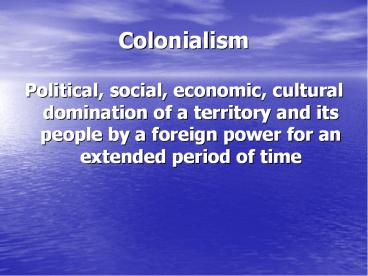Colonialism - PowerPoint PPT Presentation
Title:
Colonialism
Description:
Reduces Niger's annual debt: frees funds for basic health care, primary ... Half Niger's budget: from foreign donor resources ... – PowerPoint PPT presentation
Number of Views:102
Avg rating:3.0/5.0
Title: Colonialism
1
Colonialism
- Political, social, economic, cultural domination
of a territory and its people by a foreign power
for an extended period of time
2
2 MAJOR PHASES OF EUROPEAN COLONIALISM
- PHASE 1 1490s1820s
- Spain Portugal colonized Central, South, and
North America - Britain colonized North America, India, Australia
(1788), parts of the Caribbean - Dutch colonized South Africa, Singapore
- France colonized Canada, parts of the Caribbean
- 1800s Independence Movements began
3
TRANS-ATLANTIC SLAVE TRADE 16001800
- Europeans captured West African slaves (c. 12
million total) (in exchange for guns, alcohol,
tobacco, etc.) - Shipped slaves to the Americas and Caribbean
Islands to work on plantations (sugar, cotton,
tobacco, coffee) - Beginning of the Global Plantation Economy
4
2 MAJOR PHASES OF EUROPEAN COLONIALISM
- PHASE 2 1850s1950s
- Western Europe colonized Africa, the rest of
Asia, and the Pacific Islands - 1914 Britain and French Empires were at their
height EU Empires controlled 85 of world! - 1950s Independence Movements started to succeed
5
AFRICA
http//www.ilike2learn.com/ilike2learn/africa.html
6
AFRICA
- CONTINENT with regions (North, South, East,
West) - 1776-1870 Colonized by Europe and US during
last phase of colonialism - 1807 Britain abolished slave trade
- 1834 Britain abolished slavery established
legitimate trade in cash crops, turning
subsistence economies into mono crop economies
7
AFRICA
- 1884 Scramble for Africa at the Berlin
Conference on West Africa - 1884-1912 5 EU nationsGermany, Italy,
Portugal, France, Britain ( Spain, Belgium)
sliced Africa up like a pie - Most African nations fought for and won
independence from their colonizers in the
mid-1900s - 1960 Niger became independent from France
8
NIGER
9
NIGER
- Straddles the Sahara Sahel Deserts
- Fragile environment of semi-arid brush
- Farming shifting cultivation
- Pre-colonial Economy trans-Saharan trade in
livestock, agricultural products - Colonial Economy cowpea trade (cash crop)
- Vulnerable to drought unreliable global
commodity markets
10
NIGER
- Size about twice size of TX, 1 of hottest
countries in the world - Capital Niamey
- 2005 population estimate 11.6 million
- Ethnic Groups Hausa 56, Djerma 22, Fula 8.5,
Tuareg 8, Beri Beri (Kanouri) 4.3, Arab,
Toubou, Gourmantche 1.2, about 1,200 French
expatriates - Life Expectancy 42 years
- Resources gold, uranium, coal, iron ore, tin,
cowpeas, cotton, peanuts, millet, cassava, and
rice
11
NIGER ECONOMY
- Exports uranium ore, livestock products,
cowpeas, onions - Imports consumer goods, machinery, vehicles and
parts, gasoline, cereal - 2000 Qualified for enhanced debt relief under
the International Monetary Fund (IMF) program for
Highly Indebted Poor Countries (HIPC) - Reduces Niger's annual debt frees funds for
basic health care, primary education, HIV/AIDS
prevention, rural infrastructure, and other
programs - Half Nigers budget from foreign donor
resources - Future growth may be sustained by exploitation
of oil, gold, coal, and other mineral resources
12
NIGER POLITICS
- 1993 held first free and open elections
- 1996 1999 military coups led by Tuaregs
- 1999 National Reconciliation Council
facilitated transition to civilian rule - Since 1999 President of the Republic, Mamadou
Tandja
13
NIGER RELIGION
- 80 Muslim
- 20 Christian indigenous beliefs
- Fusion of the Worlds How do the Songhay turn to
their indigenous worldview and practices in order
to talk back to the impending crises of drought
and living in poverty?

